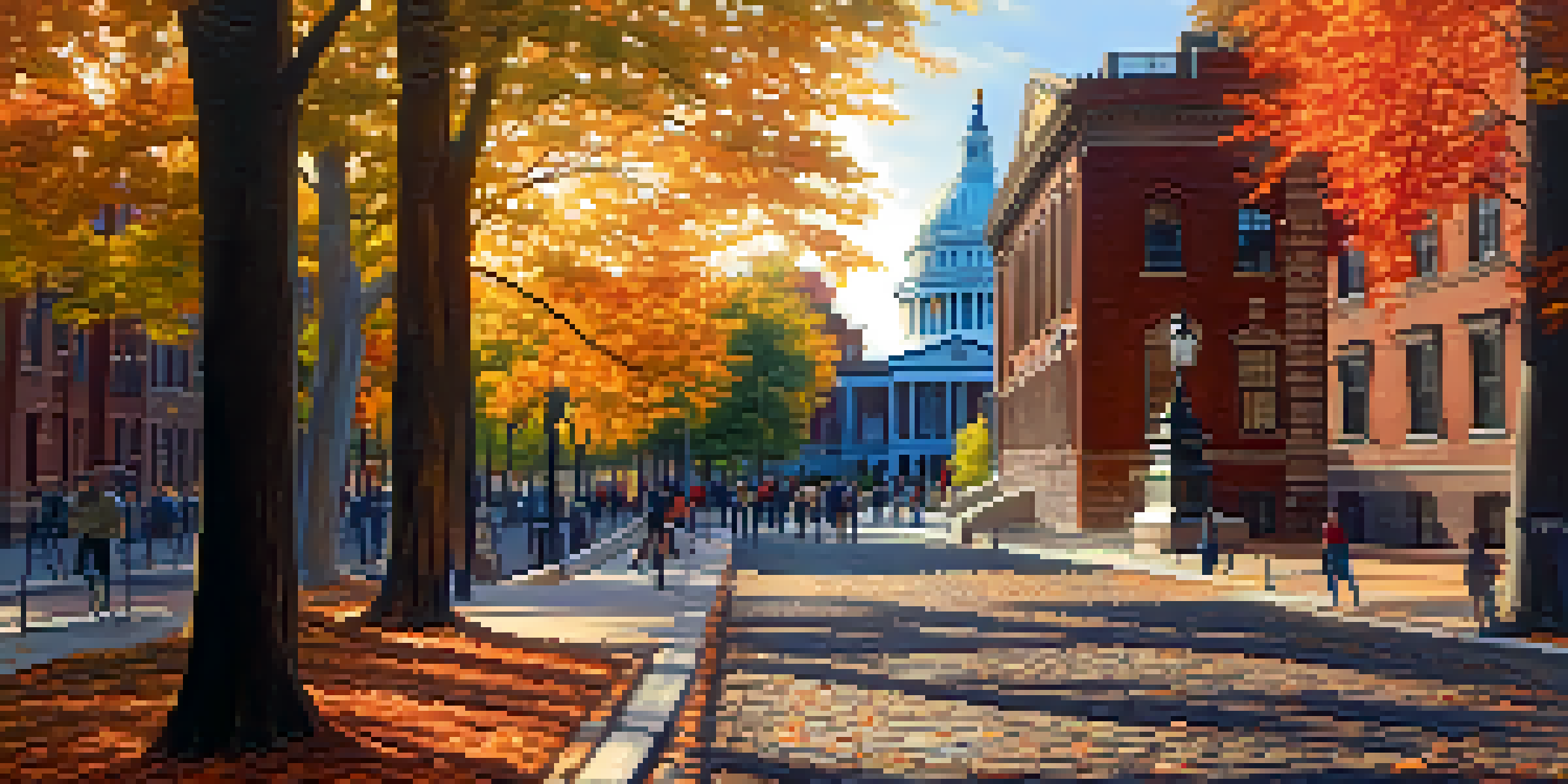Cultural Significance of Massachusetts' Tourist Hotspots

The Historical Roots of Boston's Freedom Trail
Boston's Freedom Trail is more than just a walking path; it's a journey through American history. This 2.5-mile trail connects 16 significant sites, telling the story of the Revolutionary War and the fight for independence. From the Boston Common to the Paul Revere House, each stop offers a glimpse into the past, making history accessible and engaging for visitors of all ages.
History is not a burden on the memory but an illumination of the soul.
As you stroll along the trail, it's easy to imagine the footsteps of patriots who once walked these streets. The cobblestone paths and historic landmarks evoke a sense of nostalgia, reminding us of the sacrifices made for freedom. Local guides often share tales of the Boston Tea Party and the Midnight Ride, breathing life into the historical narrative.
Moreover, the Freedom Trail has become a symbol of civic pride for Bostonians. It fosters a connection between past and present, encouraging locals and tourists alike to appreciate the values of democracy and resilience. This rich tapestry of history not only attracts visitors but also instills a sense of responsibility to preserve these stories for future generations.
The Artistic Legacy of Cape Cod
Cape Cod is renowned for its stunning landscapes, but its cultural significance also lies in its vibrant artistic community. Over the years, the Cape has inspired countless artists, writers, and musicians, creating a unique blend of creativity that permeates the region. The annual Cape Cod Art Association exhibitions showcase local talent and celebrate this artistic heritage.

Visitors can explore numerous galleries and studios, often meeting the artists behind the works. This personal connection enriches the experience, as patrons gain insight into the creative process and the inspiration drawn from the breathtaking surroundings. It's not uncommon to find artists painting en plein air, capturing the essence of Cape Cod's natural beauty.
Boston's Freedom Trail: A Historical Journey
The Freedom Trail connects 16 significant sites, making American history accessible and engaging for visitors.
Additionally, Cape Cod hosts various festivals celebrating art and culture, such as the Provincetown Film Festival. These events not only highlight local talents but also draw in international attention, fostering a sense of community and collaboration. The artistic legacy of Cape Cod continues to thrive, making it a cultural hotspot for both residents and tourists.
The Significance of Salem's Witch Trials History
Salem is famously known for its witch trials of 1692, a dark period that has left an indelible mark on American culture. Today, Salem embraces its history with various museums, reenactments, and festivals that educate visitors about the trials' complexities. The Witch House, once home to a trial judge, serves as a poignant reminder of the past and the consequences of mass hysteria.
Art is the most beautiful of all lies; it is the most beautiful of all truths.
Visitors to Salem can immerse themselves in this history through guided tours that combine storytelling with historical facts. The annual Salem Haunted Happenings in October draws crowds eager to learn about this infamous chapter while enjoying a festive atmosphere. This blend of education and entertainment makes the city's history accessible and engaging.
Moreover, the witch trials have become a powerful symbol of the dangers of scapegoating and intolerance. Today, Salem serves as a reminder of the importance of critical thinking and justice, resonating with contemporary social issues. As such, the cultural significance of Salem goes beyond its past; it encourages ongoing dialogue about human rights and societal values.
The Role of Plymouth in American Heritage
Plymouth, often referred to as 'America's Hometown,' plays a crucial role in the country's cultural heritage. The site of the first permanent European settlement in New England, it is emblematic of early American history. The iconic Plymouth Rock symbolizes the arrival of the Pilgrims, offering visitors a tangible connection to the founding of a nation.
The Plimoth Patuxet Museums recreate the 17th-century settlement, providing an immersive experience into the lives of the Pilgrims and the Wampanoag people. Through interactive exhibits and reenactments, guests can explore the complexities of early colonial life, fostering a deeper understanding of this pivotal moment in history.
Cape Cod's Artistic Community Thrives
Cape Cod is home to a vibrant artistic scene, inspiring artists and fostering cultural events that celebrate creativity.
Moreover, Plymouth's annual Thanksgiving celebration reflects the city's ongoing cultural significance. The festival highlights the themes of gratitude and community, connecting past and present. By honoring the legacy of the Pilgrims and their interactions with Indigenous peoples, Plymouth promotes awareness of cultural diversity and shared history.
The Cultural Mosaic of Worcester's Diverse Community
Worcester is a vibrant city that showcases a rich tapestry of cultures and traditions. Its diverse population contributes to a dynamic arts scene, with festivals like the Worcester Puerto Rican Festival celebrating the local Hispanic community. Such events foster inclusivity and promote cultural exchange, allowing residents and visitors to appreciate the city's multicultural identity.
The Hanover Theatre for the Performing Arts has become a hub for cultural events, hosting everything from Broadway shows to local productions. This commitment to the arts not only enriches the community but also draws visitors, enhancing Worcester's reputation as a cultural destination. By supporting a wide array of performances, the city emphasizes the importance of artistic expression.
Additionally, the presence of educational institutions like Clark University and Worcester Polytechnic Institute fosters innovation and cultural dialogue. These institutions often host events and lectures that engage the community in discussions about social issues and cultural understanding. In this way, Worcester stands as a testament to the power of diversity in shaping a vibrant cultural landscape.
The Natural Beauty of the Berkshires and Its Influence
The Berkshires, with their rolling hills and lush landscapes, have long been a source of inspiration for artists and nature lovers alike. This region is home to numerous cultural institutions, including Tanglewood, the summer home of the Boston Symphony Orchestra. The combination of natural beauty and world-class music creates a unique experience that draws visitors from all over.
Outdoor activities abound in the Berkshires, from hiking to skiing, allowing visitors to connect with nature in a profound way. The tranquil environment fosters creativity, making it a popular retreat for writers and artists seeking inspiration. As they immerse themselves in the stunning surroundings, many find that nature serves as a muse, influencing their work.
Harvard's Cultural Influence is Profound
Harvard University shapes social discourse and innovation while making art and education accessible to the public.
Moreover, the Berkshires host various cultural festivals celebrating music, art, and local cuisine. Events like the Williamstown Theatre Festival and the Berkshire Film Festival highlight the region's commitment to the arts. Through these gatherings, the Berkshires continue to cultivate a rich cultural scene, reinforcing its significance as both a natural and artistic haven.
The Modern Impact of Harvard University on Culture
Harvard University, as one of the oldest institutions of higher education in the United States, has a profound cultural significance that extends far beyond its campus. The university's diverse student body and faculty contribute to a vibrant intellectual environment, fostering innovation and creativity. Harvard's commitment to research and scholarship has led to groundbreaking discoveries that shape various fields, from science to the humanities.
The Harvard Art Museums house an impressive collection spanning centuries and cultures, making art accessible to the public. This dedication to cultural education encourages visitors to engage with art and history, fostering a deeper appreciation for global heritage. Harvard's events, lectures, and exhibitions often attract renowned speakers, further enhancing its cultural influence.

Additionally, Harvard's role in shaping social and political discourse cannot be overstated. The university has been at the forefront of numerous movements, advocating for civil rights, education reform, and social justice. Through its alumni and initiatives, Harvard continues to inspire future leaders and thinkers, solidifying its place as a cultural cornerstone in Massachusetts and beyond.
The Vibrant Culture of Lexington and Concord
Lexington and Concord are forever etched in American history as the sites of the first battles of the Revolutionary War. These towns not only serve as historical landmarks but also embody the spirit of American independence. The Minuteman National Historical Park allows visitors to engage with this pivotal moment, exploring the sites where the fight for freedom began.
Beyond their historical significance, Lexington and Concord are vibrant communities with rich cultural offerings. Local events, such as the annual Patriots' Day celebrations, bring together residents and visitors to commemorate their heritage. These festivities blend history with community spirit, making it an engaging experience for all ages.
Moreover, the towns' commitment to preserving their history and promoting education ensures that their cultural significance endures. Museums and educational programs provide insights into the lives of the Minutemen and their role in shaping the nation. This dedication to remembrance and education serves to inspire a sense of pride and connection to the past.